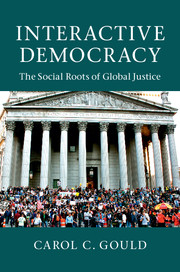Book contents
- Frontmatter
- Dedication
- Contents
- Acknowledgements
- Introduction
- Part I A theoretical framework
- Part II The social roots of global justice
- Part III Interactive democracy – transnational, regional, global
- 11 Diversity, democracy, and dialogue in a human rights framework
- 12 What is emancipatory networking?
- 13 Structuring transnational democracy: participation, self-determination, and new forms of representation
- 14 Democratic management and international labor rights
- 15 Regional vs. global democracy: possibilities and limitations
- Works cited
- Index
- References
11 - Diversity, democracy, and dialogue in a human rights framework
Published online by Cambridge University Press: 05 September 2014
- Frontmatter
- Dedication
- Contents
- Acknowledgements
- Introduction
- Part I A theoretical framework
- Part II The social roots of global justice
- Part III Interactive democracy – transnational, regional, global
- 11 Diversity, democracy, and dialogue in a human rights framework
- 12 What is emancipatory networking?
- 13 Structuring transnational democracy: participation, self-determination, and new forms of representation
- 14 Democratic management and international labor rights
- 15 Regional vs. global democracy: possibilities and limitations
- Works cited
- Index
- References
Summary
Introduction
With the growing awareness of the power and scope of global interconnectedness in its various dimensions, and the new importance of the institutions of global governance, hopes have increasingly been placed on the development of a global public sphere of discourse and deliberation. The idea is that within this sphere – or better, spheres – dialogue can take place among diverse people from a range of cultural perspectives and that by mobilizing this dialogue it may be possible for people around the world to provide input into the decisions and policies of global governance institutions and other global actors that increasingly impact their lives. If people cannot participate directly, given their numbers, then this global public sphere may perhaps function to facilitate the representation of their views by NGOs or others. The recent literature emphasizes the role of inclusive deliberative processes at the transnational level that would strive to take into account the viewpoints of those at a distance who are affected by these policies but who have not thus far been powerful enough to influence their formation or direction. And, recognizing the limitations of earlier overly rationalist models of deliberative democratic process, a broader array of features have entered the picture as desirable components of such dialogic procedures, including empathy and responsiveness, as called for by feminist philosophers and some political theorists.
- Type
- Chapter
- Information
- Interactive DemocracyThe Social Roots of Global Justice, pp. 197 - 212Publisher: Cambridge University PressPrint publication year: 2014

